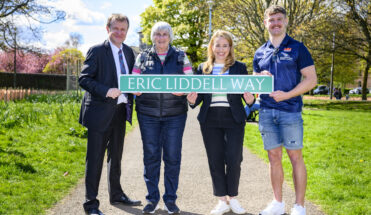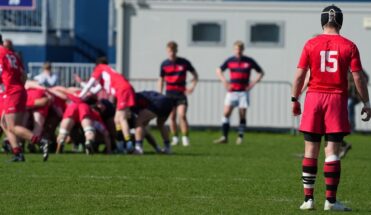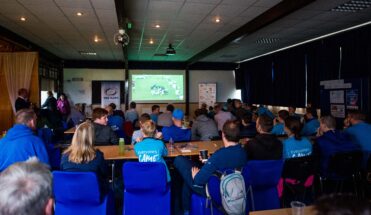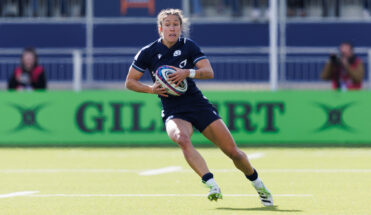Rugby In Scotland Growing At All Ages
Scottish Rugby announced today that the number of people playing the game at both adult and youth level is continuing to grow by 10% year on year. Since the Scottish Rugby development restructure in 2006, the total number of people playing rugby has risen by around 21% (from circa 24,200 to 30,500) while, importantly, the number of young people playing rugby has risen by about 24% (from circa 15,200 to 20,000). Scottish Rugby announced today that the number of people playing the game at both adult and youth level is continuing to grow by 10% year on year.Since the Scottish Rugby development restructure in 2006, the total number of people playing rugby has risen by around 21% (from circa 24,200 to 30,500) while, importantly, the number of young people playing rugby has risen by about 24% (from circa 15,200 to 20,000).The revised club focused development structure works to bring funding from local clubs and businesses together with local authorities across the country who, in partnership with Scottish Rugby, are cooperating for the continued development and growth of rugby at all levels.Some 60 jointly-funded club development officers (CDOs) are employed across Scotland and are dedicated to recruiting and retaining rugby players, coaches, referees and volunteers in and around their local communities, working continuously to create links between schools and clubs to maximise the opportunities to play rugby in their area – supported by the team of eight regional development managers. Scottish Rugby’s Head of Community Rugby, Colin Thomson, said: “The partnership between the governing body, clubs, volunteers, local authorities, sportscotland and central government has been the key to the welcome rise in participation.”Club development officers dedicate their time to recruiting and retaining rugby players in and around their community and work continuously to create links between schools and clubs to maximise the opportunities to play rugby and increase participation at all levels of the club game. “The raw talent and enthusiasm generated in schools and communities is then given the continued opportunity to play by countless committed volunteers running teams in clubs and schools across the country.”In addition to the network of development staff, the increasing popularity of the Bell Lawrie Scottish Schools Cup and the Scottish Schools Sevens, the participation growth will be further supported by newly launched community initiativesThese include the Scottish Widows Bank Rugby Champions scheme, Street Rugby, The Hygiene, Healthy Eating and Activity in Primary Schools scheme (HHEAPS) – run in partnership with the Food Standards Agency – and the HSBC Emerging Schools competition.There’s also the excellent progress made by the women’s game leading towards full integration with the SWRU and Scottish Rugby in 2009.Partnership Manager, Nick Rennie, is responsible for Scottish Rugby’s regional development network. “Providing quality, fun opportunities for as many of Scotland’s young people to play rugby is vital for the future of the game”, added Rennie.”The regional development network is fundamental to this success and I am delighted with the amount of hard work that has been carried out by countless school and club volunteers, supported by CDOs, to put us ahead of schedule to meet our strategic target of 38,000 people playing rugby by 2012 thus proving that localised planning can lead to the national growth of sporting participation.”CASE STUDIESRob Donaghue – Jointly Funded Club Development Officer, Garioch Rugby ClubLast season Rob and Garioch volunteers managed over 700 hours of coaching to over 1750 primary school pupils, delivered coaching sessions at Inverurie, Meldrum and Kemnay Academies and hosted regular rugby festivals and tournaments – all completely free of charge to the schools.A notable success is the recent TRY!RUGBY Month which concluded with a visit of the Calcutta Cup. The TRY!RUGBY initiative, which ran for the month of November, included a primary school TAG Rugby festival for over 370 children and a visit by Scotland internationalists Chris Paterson and Ross Ford.Donaghue said: “This initiative was designed to encourage those kids who enjoyed their school sessions to come and experience rugby at the club and put into practice the skills they learned throughout the past two terms of schools coaching.”The TRY!Rugby month also included an Academy Tri-Schools tournament, a foundation coaching and referee course and information session for parents and volunteers.Colin Whittaker – Jointly Funded Club Development Officer, Dundee HSFPWith just under 200 young rugby players turning out every Sunday to be trained by almost 40 qualified volunteer coaches, Colin Whittaker believes that dedicated volunteers and links with local schools through Scottish Rugby’s community initiatives are the key to the club’s success. Operating an extensive schools programme with four secondary schools and about 12 associated cluster primary schools, Colin works closely with the P6 and P7s in a four-week coaching block which ends with a rugby festival at Mayfield with all the schools in a cluster taking part. In the New Year, Colin and the club’s two SVQ community coaches will begin working with P4 and P5s in the same coaching-festival format. Whittaker said: “The initiatives are brilliant. Scottish Widows Bank Rugby Champions is great for enticing people to give that little bit more, while the FSA programme has generated a lot of support from the teachers – it’s a massive help to have their buy-in to what we’re doing.”Ciaran Beattie – Jointly Funded Club Development Officer, SelkirkSelkirk were promoted to Scottish Hydro Electric Premiership Division One at the start of the season and currently sit proudly third in the table with a team drawn mainly from their own youth development system. Ciaran Beattie, said: “Being able to say to kids in the primary schools that the players in the Selkirk first XV have been where you are and have come right through the junior structures in the town is a pretty powerful message.” Beattie paid tribute to the work over many years of Graham Marshall at Selkirk High School and Selkirk Youth Club. “His coaching has always been more about how you play the game,” he said. Selkirk currently are running three senior XVs; Selkirk Youth Club run an under-18 team and a development team; and rugby is also firmly part of the curriculum in Selkirk High School. Boyd Carswell – Jointly Funded Club Development Officer, Whitecraigs’Boyd Carswell, a former No 8/lock, is able to report growing numbers at his club on the outskirts of Glasgow. “Last year we had about 40 new players to our minis and we’re on course to match that this year. “We’re also working hard at retaining players when they make the transition from the youth game to the adult game. Six of last season’s under-18s squad that had a good cup run have played for our first XV this season. “Four out of the seven secondary schools in our area have signed up to the Scottish Widows Bank Rugby Champions scheme and it’s very encouraging that four boys from St Luke’s in Barrhead, which isn’t exactly a traditional rugby area, are coming along to our under-13 team thanks to the Scottish Widows Bank Rugby Champions initiative.”Participation increase over the past two years is broken down as follows:Youth participationc15, 200 in 2006c18,100 in 2007 up c2900 (16%)c20,000 in 2008 up c1900 (10%)Youth increase since restructure c4800 / 24%Adult participationc9,000 in 2006c9,600 in 2007 up 600 (c6%)c10,500 in 2008 up 900 (c9%)Adult increase since restructure c1500 / 14%Total increase since restructurec6300 / 21%* New percentages are based on rounded figures from numerous sources including club membership and insurance returns, school affiliate membership returns, Scottish Rugby’s online registration system and reports fed back to regional development management from club development officers around the country.BELL LAWRIE SCOTTISH SCHOOLS CUPEntries for the 2008/2009 Bell Lawrie Scottish Schools Cup have set another new record with 35 more teams entering Scottish Rugby’s flagship schools competition than ever before. The tournament has broken entry records for the past three consecutive years with the total number of competing teams soaring from 184 in 2006/2007 to 244 in 2008/2009 – a massive 33% increase.SCOTTISH SCHOOLS SEVENSIn 2008 sixty-four teams from all over Scotland made their way to Murrayfield to play in our flagship youth sevens event which is a showcase for the attributes that the abbreviated game exemplifies – teamwork, commitment, skill and fitness. 152 games are played on the day, in a format that gives every competing school the chance to play in a minimum of four and a maximum of six matches.SVQ APPRENTICE PROGRAMMEThe apprentices, sponsored by rugby clubs work in tandem with Scottish Rugby’s community rugby department, towards a Scottish Modern Apprenticeship and deliver the opportunity to thousands of Scottish schoolchildren on a weekly basis to experience rugby and become physically active, regardless of where they live.The Community Coach programme was launched in partnership with Scottish Rugby and Dawes Training Consultancy Ltd and has, for the past seven years, continued to develop and flourish, and has promoted exceptionally high standards of achievement which have been adopted and exemplified by the graduates honoured each year. Each of the candidates is supported throughout their vocation by their hometown clubs and, in many cases, their local authorities. These groups should also be applauded for their foresight in forwarding suitable candidates into the programme, so ensuring that rugby at grassroots level within their own communities is offered to all children as an acceptable and positive sporting option.The community coaching initiative, at any given time, has in the region of 50 young people involved in the programme and has received nationally-acclaimed success.SCOTTISH WIDOWS BANK RUGBY CHAMPIONS SCHEMERugby Champions aims to increase the number and amount of rugby played in state secondary schools while rewarding the dedicated school staff who give up their spare time to take extra-curricular rugby.The programme operates by rewarding the school’s registered rugby champion with personal coaching kit, and provides the school with specialist rugby equipment for coaching and training; additional equipment is then provided as rugby develops at the school in accordance with levels of participation.CASHBACK FOR COMMUNITIESScottish Rugby welcomed the announcement by the Scottish Government that they are to inject some £1.4million into youth rugby in Scotland in the next three years. The sum is being delivered through the Government’s “Cashback for Communities” initiative, whereby cash recovered by the authorities after criminals have been dealt with by the justice system is reinvested in communities throughout Scotland, rural as well as urban. Scottish Rugby put together a detailed application for funding through the scheme, stressing its belief that sport in general and rugby in particular can play a major role in developing young people, especially those in disadvantaged areas. Street RugbyUtilising a portion of the £1.4million ‘Cashback for Communities’ funding from the Scottish Government, Scottish Rugby has created an easy to play and portable version of the game to engage with young people in their neighbourhoods.Young people aged between 10 and 19 have been taking part in non-contact forms of rugby and basic passing and running drills while the more ambitious of the participants are introduced to the basic elements of the contact game. Street Rugby aims to provide free rugby coaching and playing activities for a total of 12,000 youngsters by 2011.HYGIENE, HEALTHY EATING AND ACTIVITY IN PRIMARY SCHOOLSThe Food Standards Agency Scotland (FSAS) has teamed up with Scottish Rugby and the Scottish Football Association to launch a new partnership which will encourage thousands of youngsters across the country to increase their knowledge of food hygiene, healthy eating and improve their activity levels.Almost 10,000 school children from 350 primary schools across Scotland will take part in the Hygiene, Healthy Eating and Activity in Primary Schools (HHEAPS) initiative each year for the next three years. The programme comprises a six-week training course for boys and girls in primaries four to six. The course is designed to make children more aware of the benefits of good food hygiene and healthy eating.Colin Thomson, Scottish Rugby’s head of community rugby, added: “Food hygiene, exercise and healthy eating are three of the most important lessons we can teach kids today. These lessons are reinforced by Scottish Rugby’s club development staff nationwide with further learning and exercise using outdoor fun-based rugby activities”.HSBC EMERGING SCHOOLS COMPETITIONThe HSBC Rugby Festivals aim to encourage children who don’t necessarily have many opportunities to play rugby to get involved with the sport.Over the coming six months, the HSBC Rugby Festivals will involve more than 60,000 children, as well as over 3,000 teachers and coaches in the one-day festivals staged in England, Ireland, Scotland and Wales. The series of festivals will ensure that children from every region across Scotland have the opportunity to take part, stay active and make new friends.The initiative will culminate in South Africa during the Lions Tour next summer with more coaching festivals in Cape Town, Johannesburg, Durban and Port Elizabeth.
Tags
Related news

Legacy in the Links: Path in Bruntsfield renamed to honour Eric Liddell

Obituary: William (Bill) Smith

Scotland team named for Guinness Women’s Six Nations finale in Belfast

Independent Disciplinary update: Chloe Rollie

Brown to retire from rugby at the end of the season

Final Silver Saturday teams confirmed

Inter-city double header as Edinburgh Rugby U16 host Glasgow Warriors U16

Visit a Scottish Gas Net Zero Roadshow at your local rugby club

Lloyd set for milestone cap against Azzurri





